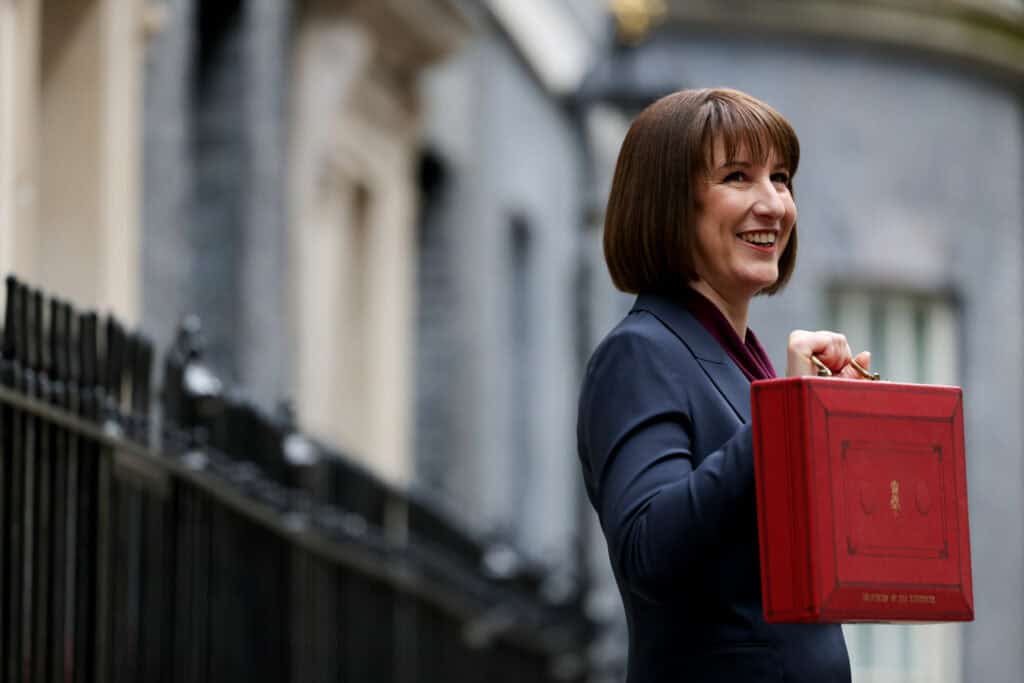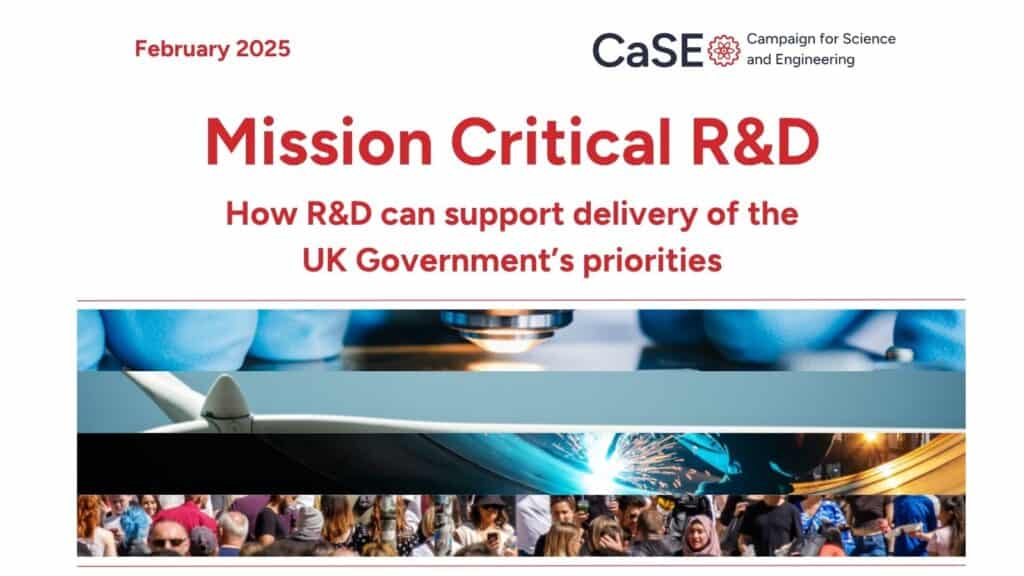CaSE has welcomed the Government’s Spending Review and Autumn Statement, announced by the Chancellor George Osborne today
CaSE responds to the the 2015 Spending Review
25 Nov 2015
Among the headline figures, the Government has committed to protecting the £4.7 billion science budget in real terms up to the 2019/20.
Commenting on the announcement, CaSE Acting Director Naomi Weir, said,
“I’m delighted to hear the Chancellor backing science with real investment for the next five years. This announcement is great news for the UK and provides a platform to build on for future success.
This spending review brings some very welcome good news for UK science. It has delivered real investment in science, a decade of support for an industrial strategy, cash protection for Innovate UK, real terms protection of funding for high-cost subjects in HE, and some much needed protection for adult skills funding.
Committing to invest in science and innovation, is investing for the future: creating high-value jobs, driving productivity, and catalysing economic growth. It will have far reaching benefits in education, security and resilience, and health. There are undoubtedly some details to unpick, but it is encouraging on many counts to see that the government has listened to the science community and made an evidence-informed decision to back science and engineering in today’s Spending Review.”
For a full breakdown of how science and engineering fared in the 2015 Spending Review see below.
Science Budget
- The government will protect the £4.7 billion science budget in real terms up to the end of the parliament.
- This includes a new £1.5 billion Global Challenges fund to ensure UK science takes the lead in addressing the problems faced by developing countries whilst developing our ability to deliver cutting-edge research.
- No mention of ring-fence.
Health research
- Invest over £5 billion in health research and development, as well as up to £150 million to launch a Dementia Institute and a new £1 billion Ross Fund, partnered by the Bill and Melinda Gates Foundation.
- Launching the Global Antimicrobial Resistance Innovation fund, partnered with China.
- The government will invest £10 million in expanding the Healthcare Innovation Test Bed programme.
- £250 million for the 100,000 Genomes Project to introduce whole genome sequencing technology in the NHS, including funding for Genomics England
- £400 million to fund Public Health England labs in Essex to help combat threats such as flu and Ebola.
Innovate UK
- Flat cash for Innovate UK
- The government will also look to integrate Innovate UK into Research UK in order to strengthen collaboration between the research base and the commercialisation of discoveries in the business community. Innovate UK will retain its clear business focus and separate funding stream.
- The Spending Review and Autumn Statement increases investment in catapult centres and protects and extends funding for the Aerospace Technology Institute (ATI) and the Advanced Propulsion Centre (APC).
- The government will introduce new finance products to support companies to innovate following best practice in countries such as France, Finland and the Netherlands. These will replace some existing Innovate UK grants, and reach £165 million per year by 2019-20, so that total Innovate UK support is maintained in cash terms.
Capital Investment
- The Government reaffirmed its long term science capital commitment of £6.9 billion between 2015-2021. This includes up to £150 million (total capital and resource) to launch a competition for a Dementia Institute, to build on the UK’s strengths in medical research.
- In addition to the £6.9 billion figure, the government will invest £75 million in the University of Cambridge’s Cavendish Laboratories.
Nurse Review Response
- The government is taking forward the recommendations of Paul Nurse’s independent review and, subject to legislation, will introduce a new body – Research UK – which will work across the seven Research Councils.
General research funding
- The government will also take forward a review of the Research Excellence Framework in order to examine how to simplify and strengthen funding on the basis of excellence, and will set out further details shortly.
- The government commits to funding aerospace and automotive technologies for 10 years in cash terms. This will provide over £1 billion additional funding for innovation in these sectors.
- Government will double spend on energy innovation and invests £250 million in an ambitious nuclear research and development programme.
R&D Tax Credits
- No announcements further to the Summer Budget.
Departmental R&D
- No further announcements on departmental R&D, despite plans in the Government’s 2014 Science and Innovation Strategy.
Apprenticeships
- By 2019-20 government spending on apprenticeships, including income from the new apprenticeship levy, will be double the level of spending in 2010-11 in cash terms.
- The apprenticeship levy on larger employers announced in the Summer Budget will be introduced in April 2017. It will be set at a rate of 0.5% of an employer’s paybill and will only be paid on any paybill in excess of £3 million.
- The government will establish a new employer-led body to set apprenticeship standards and ensure quality.
Adult skills funding
- The government will protect funding for the core adult skills participation budgets in cash terms, at £1.5 billion.
- The government will create 5 National Colleges and will support a new network of Institutes of Technology across the country. National Colleges will train an estimated 21,000 students by 2020 in industries highlighted in the Government’s productivity agenda.
- The government will expand tuition fee loans to 19 to 23 year olds at levels 3 and 4, and 19+ year olds at levels 5 and 6 to provide a route for learners to develop high-level technical and professional skills.
STEM Subjects and Teaching
- For all STEM subjects, tuition loans will be extended to students wishing to do a second degree from 2017-18.
- The government will support 800 more National Leaders of Education to support schools’ performance, while increasing funding for teacher training and recruitment to deliver the English Baccalaureate and more specialist STEM teaching.
HE
- The government will provide funding for a real terms protection for the overall budget for STEM subjects in higher education (HE).
- The government will reduce the teaching grant by £120 million in cash terms by 2019-20, but allow funding for high cost subjects to be protected in real terms. The government will also make savings in other areas of the teaching grant, including cuts to Student Opportunity Fund.
- The government will provide new financial support through maintenance loans for part time HE students, tuition fee loans for higher level skills in Further Education and new loans for postgraduate Master’s degrees, reaching £1 billion in 2019-20 and benefiting around 250,000 students.
- Following a sharp decline in part-time students since 2008, the government will introduce new part-time maintenance loans from 2018-19 to support the cost of living while studying.
Diversity
- The government will work with the Director of Fair Access to ensure universities take more responsibility for widening access and social mobility, and ask the Higher Education Funding Council for England to retarget and reduce the student opportunity fund, focusing funding on institutions with the most effective outcomes.
- Maintenance loan support will rise for students from low and middle-income backgrounds by up to £8,200 a year for those who are studying away from home, outside London.
- The government will lift the age cap on new loans to postgraduates from 2016-17 so they are available to all those under 60.
Related press

CaSE’s initial response to the publication of the Department for Science Innovation and Technology (DSIT) spending allocations for 2025/26.

On 26th March 2025 the Chancellor, Rachel Reeves, delivered a spring statement. Here is CaSE’s initial response.

A new report sets out evidence, including public opinion polling, on the integral role of R&D in driving progress on the UK Government’s missions.

CaSE’s initial response following the 2024 Autumn Budget delivered by Chancellor, Rt Hon Rachel Reeves MP.